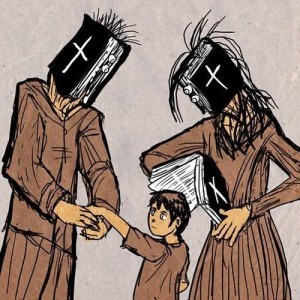“Finally, brethren, whatever is true, whatever is honorable, whatever is right, whatever is pure, whatever is lovely, whatever is of good repute, if there is any excellence and if anything worthy of praise, dwell on these things.” Philippians 4:8
This post is the sixteenth in a series that addresses a list of “40 harmful effects of Christianity” that originated on the American Atheists Facebook page and has since made its way around the internet. In this post, I examine the following “harmful effect” from the list:
Harmful Effect #16: Censorship (often destructive) of speech, art, books, music, films, poetry, songs and, if possible, thought..
In my previous post in this series, I made the following observation:
“Given the history officially atheistic nations (such as the USSR, Khmer Rouge Cambodia, Communist North Korea, and Communist China), it’s clear that many atheists do not support systems of government where laws of any kind are made democratically and where speech is made freely.”
This observation is not controversial or contentious in any way. In fact, it is a widely-accepted observation about well-known historical facts. In light of this observation, it’s almost unfathomable that anyone could make an assertion such as “harmful effect #16.” Societies which are explicitly irreligious and atheistic have been some of the most suppressive of speech, art, books, music, films, poetry, songs, and thought. How, then, can such actions be considered a harmful effect of Christianity? Rather, actions such as these are more properly considered (like so many other items on this list) harmful effects of humanity.
Furthermore, this harmful effect implies that censorship is harmful in and of itself. Some forms of censorship are arguably appropriate. Young children, for example, shouldn’t be exposed to pornographic films and profane language. These are things that should be censored, and are, even in secular nations such as the United States of America. Christians have influenced censorship standards in the United States and elsewhere. Likewise, Christians have influenced policies which advocate freedom of speech and freedom of thought. Once again, I am making relatively uncontroversial assertions. Harmful Effect #16 does not stand.
Christians reading this should thoughtfully consider the function to which we are called in this world. Christians are called to be salt and light. As Paul communicated to the Church at Philippi, Christians should dwell on pure things. Christians can not reasonably expect a lost world to do the same. While there are some restraints in place with regards to the common grace that God gives to all the world, lost people cannot be expected to adhere to the same standards to purity and piety that Christians live out in the power of Christ. Christians should never need government censors to regulate their standards of behavior, for Christians are called to be set apart as a Holy nation that is not limited or defined by political laws and earthly borders.
In my next post in this series, I’ll address the following:
Harmful Effect #17: The demonization of other religions, e.g. Christianity demonizing Pagans (“They’re devil-worshipers!”)[
[Contributed by G. Seth Dunn]
*Please note that the preceding is my personal opinion. It is not necessarily the opinion of any entity by which I am employed, any church at which I am a member, any church which I attend, or the educational institution at which I am enrolled. Any copyrighted material displayed or referenced is done under the doctrine of fair use
- 40 harmful effects of Christianity #1 – The Discouragement of Rational Thought
- 40 harmful effects of Christianity #2 – Vilification of Homosexuality
- 40 harmful effects of Christianity #3 – Women Treated Like Second-Class Citizens
- 40 harmful effects of Christianity #4 – Children Growing Up To Hate Science
- 40 Harmful Effects of Christianity #5 – Thousands Killed as Witches
- 40 harmful effects of Christianity #6 – People Aren’t Making the Most of This Life
- 40 harmful effects of Christianity #7 – People Dying Because They Believe They Are Immune to Reality
- 40 harmful effects of Christianity #8 – People Dying Because They Don’t Accept Medical Help
- 40 harmful effects of Christianity #9 – People Beaten to Death During Exorcisms
- 40 harmful effects of Christianity #10 – Genital Mutilation of Babies
- 40 harmful effects of Christianity #11 – Psychological Conditions Blamed on Demons
- 40 harmful effects of Christianity #12 – Disowning Family Members for Leaving Their Religion
- 40 harmful effects of Christianity #13 – Friendships Severed Over Religious Differences
- 40 harmful effects of Christianity #14 – “Abstinence-only” sex education
- 40 harmful effects of Christianity #16 – Censorship
- 40 harmful effects of Christianity #17 – The Demonization of Other Religions
- 40 harmful effects of Christianity #18 – Children Memorizing Religious Texts
- 40 Harmful Effects of Christianity #19 – People Believe the World is About to End
- 40 Harmful Effects of Christianity #20 – Long-Term Environmental Issues Ignored
- 40 Harmful Effects of Christianity #21 – Wives Will Go to Hell if They Leave Their Abusive Husbands
- 40 Harmful Effects of Christianity #22 – Holy Wars
- 40 Harmful Effects of Christianity #23 – The Destruction of Great Works of Art
- 40 Harmful Effects of Christianity #24 – Slavery Condoned by Religious Texts
- 40 Harmful Effects of Christianity #25 – Children traumatized by Descriptions of Hell
- 40 Harmful Effects of Christianity #26 – Terminal Patients Would End Their Lives
- 40 Harmful Effects of Christianity #27 – Schools Have to Fight to Teach Evolution
- 40 Harmful Effects of Christianity #28 – Persecution of “Heretics”
- 40 Harmful Effects of Christianity #29 – Blue Laws
- 40 Harmful Effects of Christianity #30 – Officials Voted in Because of their Religious Beliefs
- 40 Harmful Effects of Christianity #31 – Abuse of Power by Religious Leaders
- 40 Harmful Effect of Christianity #32 – People Accepting Hallucinations as Divine
- 40 Harmful Effects of Christianity #33 – Discrimination Against Atheists











